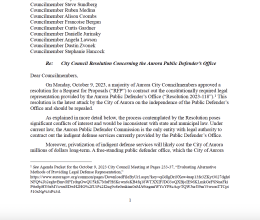JAILED DEFENDANTS TOO POOR TO BOND OUT REQUIRE COUNSEL AT FIRST APPEARANCE
The U.S. Supreme Court has held the first appearance in court is a “critical stage” where the defendant’s right to counsel attaches. A defendant’s first appearance involves much more than an advisement of rights, and often results in a guilty plea. At this stage, counsel can advocate for reduced bond, ensure the defendant is not inappropriately pressured to plead guilty, advise defendants on the collateral consequences of a guilty plea, and guard against wrongful convictions.
Municipal courts stand alone in denying in-custody defendants counsel at first appearance. In state and county courts, the public defender is available at first appearance to advocate for release of jailed defendants and to advise these defendants on possible pleas when jail is a possible sentence. In almost all Colorado municipal courts, however, municipal defendants must face the judge alone, must make arguments for release alone, and must decide how to plead alone.
Impoverished municipal inmates frequently plead guilty just to get out of jail. Appearing alone before a judge, municipal defendants face a terrible choice: ask for counsel and return to jail until your next court appearance when counsel will be present OR plead ‘guilty’ and get out of jail quicker. Understandably, most municipal defendants simply plead guilty at first appearance to secure their fast release from jail, even those who are innocent and have strong legal defenses.
HB 1309 BRINGS FAIR AND CONSTITUTIONAL PRACTICES TO MUNICIPAL COURTS
HB 1309 ensures counsel at first appearance to the most vulnerable defendants. It requires counsel be provided at first appearance to those defendants who are so poor that they cannot afford to bond out of jail on a minor municipal offense and who face a possible jail sentence.
HB 1309 ensures all defendants in Colorado have the same access to counsel. Unlike municipal courts, Colorado’s state and county courts already automatically provide counsel to criminal defendants at their first court appearance when they are too poor to post bond and face a possible jail sentence. This bill creates parity between municipal courts and all other Colorado criminal courts.
HB 1309 brings Colorado’s municipal courts in line with constitutional standards. By providing counsel at first appearance, when most municipal defendants plead guilty, municipal courts come in line with Supreme Court caselaw holding that first appearance and guilty pleas are “critical stages” where the right to counsel attaches.
HOW MUNICIPALITIES MAY AVOID POTENTIAL COSTS ASSOCIATED WITH IMPLEMENTATION OF HB 1309
**While costs should never excuse failure to meet constitutional standards or failure to ensure fairness in criminal proceeding, municipalities have several ways to avoid significant expenditures in implementing the provisions of HB 1309.
1. Municipalities may designate all or many city offenses as non-jailable. The bill does not require appointment of counsel for individuals held for a non-jailable offense. Most municipal ordinances regulate non-violent conduct that, standing alone, poses no threat to public safety – such as park hours restrictions and limitations on panhandling. Municipalities may choose to designate such ordinances as infractions that are not punishable by jail. Colorado Springs and Arvada are examples of cities that have amended their municipal codes to make many city offenses non-jailable.
2. Municipal prosecutors may waive jail for all or most city offenses or may waive jail for any individual who is still in custody at the time of first appearance. The bill does not require appointment of counsel for individuals who do not face a possible jail sentence, even if held in jail for failure to appear.
3. Municipal courts may immediately or at first appearance release all individuals arrested for a municipal offense on a personal recognizance bond or unsecured monetary bond. The bill does not require appointment of counsel for individuals who are not in custody.
4. Municipal police may issue citations for municipal ordinance violations instead of making custodial arrests. For serious offenses, municipal police may charge violators under Colorado law, rather than municipal law. As a result, the state public defender’s office – rather than the municipality – would then be the entity responsible for appointment of counsel at first appearance for those in custody. Some smaller municipalities, such as Hooper and Morrison, have already adopted this practice.
